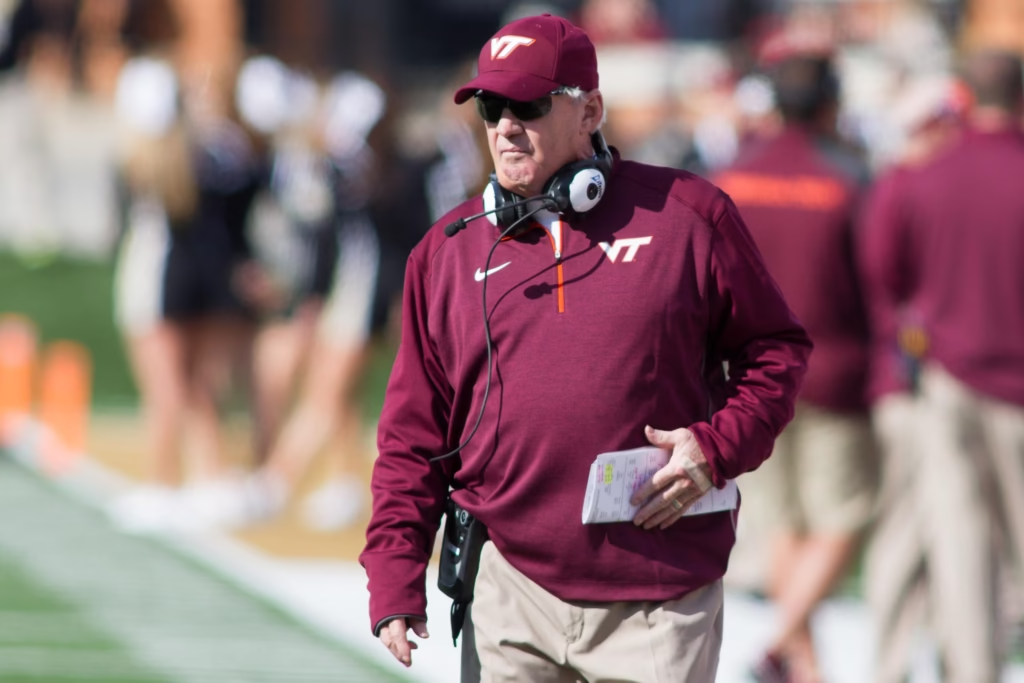Few coaches in college football history have left a mark as lasting as Frank Beamer. Over nearly three decades at Virginia Tech, Beamer turned the Hokies into a national powerhouse, establishing a culture of excellence that still influences the program today. From his innovative special teams strategies to his reputation as a program builder, Beamer’s legacy is one of resilience, consistency, and success.
The Early Years: Building a Contender
When Beamer took over as head coach at Virginia Tech in 1987, the program was far from a national contender. The team had struggled with inconsistency, and the resources available were not on par with some of the sport’s powerhouse programs. Despite these challenges, Beamer gradually built the Hokies into a competitive force. His emphasis on discipline, player development, and a relentless work ethic helped change the culture of the team.
Beamer’s first few seasons were difficult, with losing records in three of his first four years. However, he stuck to his vision, recruiting hard-nosed players and implementing a system that prioritized defense and special teams. By the mid-1990s, the Hokies were emerging as a serious threat in college football.
Beamerball: A Game-Changer

One of the defining aspects of Beamer’s coaching philosophy was his emphasis on special teams. “Beamerball,” as it became known, revolutionized how teams approached this often-overlooked phase of the game. Under Beamer’s leadership, Virginia Tech consistently led the nation in blocked kicks, and his teams often turned special teams plays into game-changing moments.
Blocked punts, aggressive returns, and defensive touchdowns became a staple of Virginia Tech football, making the Hokies one of the most exciting teams to watch. This strategy not only helped the team win games but also reinforced Beamer’s reputation as a coach who maximized every aspect of the game to gain an advantage.
The 1999 National Championship Run
The pinnacle of Beamer’s career came in 1999 when he led Virginia Tech to an undefeated regular season and a spot in the BCS National Championship Game against Florida State. Behind freshman quarterback Michael Vick, the Hokies stormed through their schedule, capturing the imagination of college football fans across the country.
Though Virginia Tech ultimately fell short in the championship game, losing to a dominant Florida State team, Beamer’s team had arrived on the national stage. The Hokies’ success that season cemented the program as a consistent contender, proving that Beamer’s vision had been fully realized.
Sustained Success and a Lasting Legacy
Following the 1999 season, Virginia Tech remained one of the most consistent programs in college football. Under Beamer, the Hokies won seven conference championships, including multiple ACC titles after moving from the Big East. They also recorded 13 consecutive 10-win seasons from 2004 to 2011, an achievement few programs can match.
Beamer retired in 2015 with an overall record of 280-143-4, making him one of the winningest coaches in college football history. His contributions to the game were recognized when he was inducted into the College Football Hall of Fame in 2018.
More Than Just Wins
Beyond the victories and accolades, Beamer’s impact on Virginia Tech went far beyond the field. He was known for his integrity, loyalty, and deep connection to his players and the university. Many of his former players have gone on to successful careers in football and beyond, crediting Beamer for shaping them into leaders.
His influence on college football remains strong, particularly in how teams approach special teams and program building. Even after his retirement, Beamer continues to be involved in the sport, offering his insights and serving as an ambassador for Virginia Tech.
Conclusion
Frank Beamer’s legacy is one of perseverance, innovation, and excellence. He took Virginia Tech from an overlooked program to a national powerhouse, all while maintaining a reputation for class and sportsmanship. Whether through “Beamerball,” his impact on his players, or his lasting mark on Virginia Tech, his influence on college football will never be forgotten.
Why Shoppers Are Boycotting Amazon—The Controversy Explained






